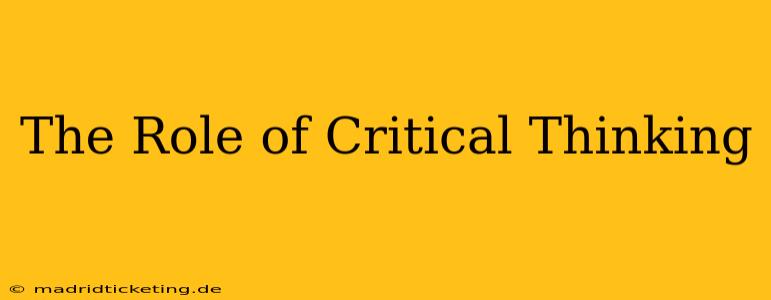Critical thinking. The phrase itself evokes images of intense focus, rigorous analysis, and perhaps even a furrowed brow. But its importance extends far beyond academic circles. In today's complex and rapidly changing world, critical thinking isn't just a desirable skill—it's a necessity for navigating information overload, making sound judgments, and solving problems effectively. This article will explore the multifaceted role of critical thinking, examining its core components and its application in various aspects of life.
What Exactly is Critical Thinking?
At its core, critical thinking involves actively and skillfully conceptualizing, applying, analyzing, synthesizing, and/or evaluating information gathered from, or generated by, observation, experience, reflection, reasoning, or communication, as a guide to belief and action. It's not merely about finding fault or being negative; instead, it's about approaching information with a discerning mind, questioning assumptions, identifying biases, and evaluating evidence objectively. It's a process that allows us to form well-reasoned judgments and make informed decisions.
How Does Critical Thinking Differ from Other Thinking Styles?
Critical thinking distinguishes itself from other thinking styles, such as passive acceptance or emotional reasoning, through its systematic and objective approach. Unlike passive acceptance, which readily accepts information without question, critical thinking demands evidence and logical reasoning. In contrast to emotional reasoning, which relies on feelings and intuitions, critical thinking prioritizes objective analysis and evaluation, even when emotions are involved. This systematic approach is what sets critical thinking apart and makes it such a powerful tool.
Why is Critical Thinking Important?
The significance of critical thinking permeates virtually every aspect of modern life. It’s crucial for:
- Effective Problem-Solving: Critical thinking allows us to break down complex problems into manageable parts, identify root causes, and develop creative solutions.
- Informed Decision-Making: In a world saturated with information, critical thinking helps us discern credible sources from unreliable ones, enabling us to make informed choices.
- Successful Communication: Articulating thoughts clearly and persuasively, understanding different perspectives, and engaging in constructive dialogue all rely on strong critical thinking skills.
- Innovation and Creativity: Questioning existing assumptions and exploring new possibilities are vital for innovation, and critical thinking provides the framework for this process.
- Personal Growth and Development: By examining our own beliefs and biases, we can foster personal growth and enhance our self-awareness.
What are the Key Components of Critical Thinking?
Several key components underpin effective critical thinking:
- Analysis: Breaking down information into its constituent parts to understand its structure and relationships.
- Interpretation: Determining the meaning and significance of information.
- Inference: Drawing conclusions based on available evidence and reasoning.
- Evaluation: Assessing the credibility, accuracy, and relevance of information.
- Explanation: Clearly and concisely communicating one's reasoning and conclusions.
- Self-Regulation: Monitoring one's own thinking processes and adjusting them as needed.
How Can I Improve My Critical Thinking Skills?
Developing critical thinking skills is an ongoing process that requires consistent effort and practice. Here are some strategies:
- Question Assumptions: Regularly challenge your own assumptions and those of others.
- Seek Diverse Perspectives: Expose yourself to a variety of viewpoints to broaden your understanding.
- Identify Biases: Be aware of your own biases and those present in information sources.
- Evaluate Evidence: Assess the credibility and reliability of information before accepting it as true.
- Practice Reasoning: Regularly engage in activities that require logical reasoning and problem-solving.
- Seek Feedback: Solicit feedback from others to gain different perspectives on your thinking.
What are the Barriers to Critical Thinking?
Several factors can hinder our ability to think critically:
- Cognitive Biases: These are systematic errors in thinking that can distort our judgment.
- Emotional Influences: Strong emotions can cloud our judgment and prevent objective analysis.
- Lack of Information: Insufficient knowledge can limit our ability to evaluate information effectively.
- Confirmation Bias: The tendency to seek out information that confirms pre-existing beliefs while ignoring contradictory evidence.
How is Critical Thinking Used in Different Fields?
Critical thinking is not limited to a specific field; its applications are far-reaching:
- Science: Formulating hypotheses, designing experiments, and interpreting data all rely heavily on critical thinking.
- Business: Strategic planning, problem-solving, and decision-making in a business context require a critical approach.
- Healthcare: Diagnosing illnesses, developing treatment plans, and evaluating patient outcomes demand critical thinking.
- Education: Teachers utilize critical thinking to design effective learning experiences and assess student understanding.
- Law: Analyzing evidence, constructing legal arguments, and interpreting legal precedents all necessitate critical thinking.
Conclusion: The Power of Critical Thinking
In an era defined by information overload and rapid change, critical thinking is no longer a luxury; it's a fundamental skill essential for success in all aspects of life. By cultivating our critical thinking abilities, we empower ourselves to make informed decisions, solve complex problems, and navigate the challenges of the modern world with greater confidence and clarity. The journey of honing critical thinking skills is continuous, demanding ongoing self-reflection and a commitment to intellectual rigor. However, the rewards—enhanced problem-solving, more informed decision-making, and greater personal growth—are immeasurable.

